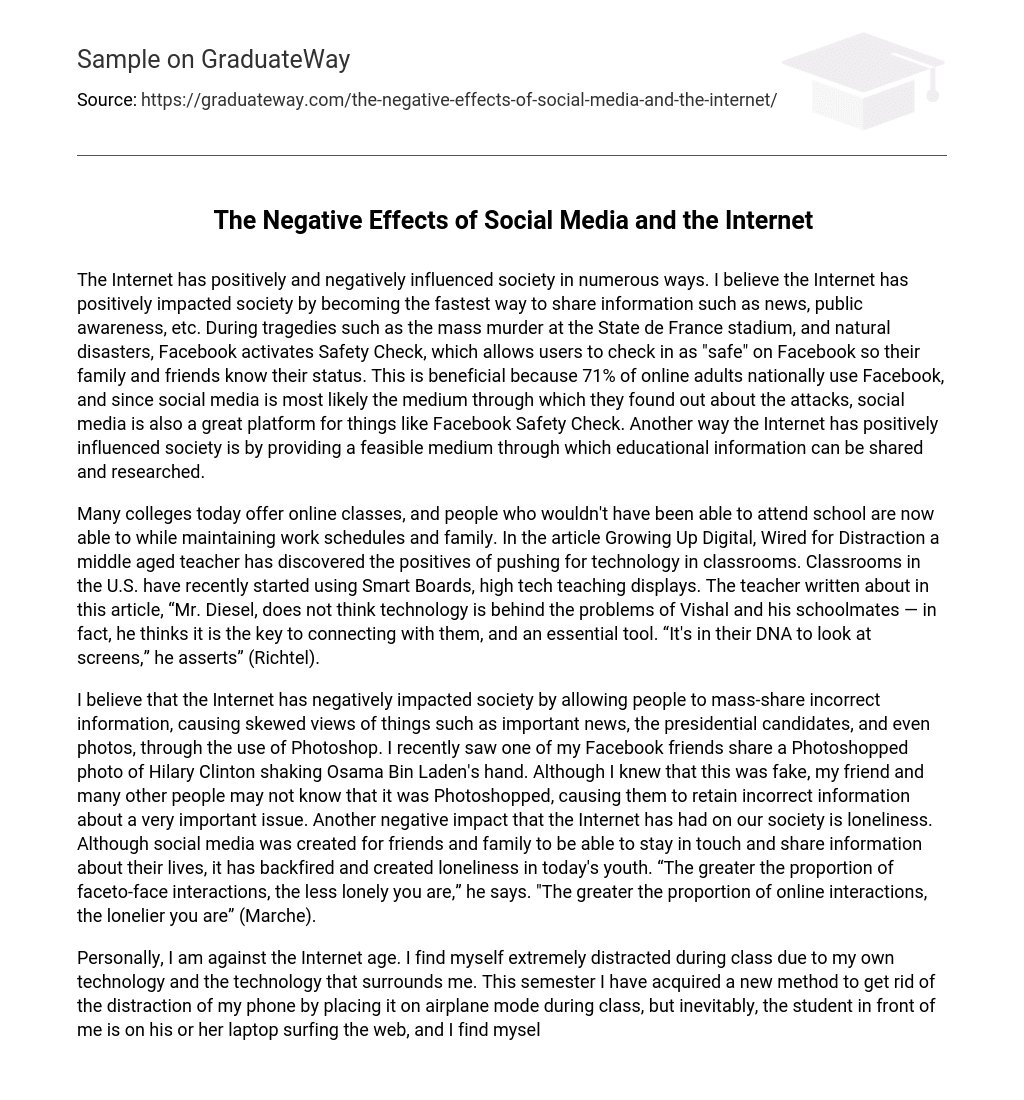The Internet has positively and negatively influenced society in numerous ways. I believe the Internet has positively impacted society by becoming the fastest way to share information such as news, public awareness, etc. During tragedies such as the mass murder at the State de France stadium, and natural disasters, Facebook activates Safety Check, which allows users to check in as “safe” on Facebook so their family and friends know their status. This is beneficial because 71% of online adults nationally use Facebook, and since social media is most likely the medium through which they found out about the attacks, social media is also a great platform for things like Facebook Safety Check. Another way the Internet has positively influenced society is by providing a feasible medium through which educational information can be shared and researched.
Many colleges today offer online classes, and people who wouldn’t have been able to attend school are now able to while maintaining work schedules and family. In the article Growing Up Digital, Wired for Distraction a middle aged teacher has discovered the positives of pushing for technology in classrooms. Classrooms in the U.S. have recently started using Smart Boards, high tech teaching displays. The teacher written about in this article, “Mr. Diesel, does not think technology is behind the problems of Vishal and his schoolmates — in fact, he thinks it is the key to connecting with them, and an essential tool. “It’s in their DNA to look at screens,” he asserts” (Richtel).
I believe that the Internet has negatively impacted society by allowing people to mass-share incorrect information, causing skewed views of things such as important news, the presidential candidates, and even photos, through the use of Photoshop. I recently saw one of my Facebook friends share a Photoshopped photo of Hilary Clinton shaking Osama Bin Laden’s hand. Although I knew that this was fake, my friend and many other people may not know that it was Photoshopped, causing them to retain incorrect information about a very important issue. Another negative impact that the Internet has had on our society is loneliness. Although social media was created for friends and family to be able to stay in touch and share information about their lives, it has backfired and created loneliness in today’s youth. “The greater the proportion of faceto-face interactions, the less lonely you are,” he says. “The greater the proportion of online interactions, the lonelier you are” (Marche).
Personally, I am against the Internet age. I find myself extremely distracted during class due to my own technology and the technology that surrounds me. This semester I have acquired a new method to get rid of the distraction of my phone by placing it on airplane mode during class, but inevitably, the student in front of me is on his or her laptop surfing the web, and I find myself not being able to take my eyes off of their screen. It also distracts me from family and friend time. My friends and I won’t even realize an hour has passed and we have just been on our phones when we should be spending the precious time together talking face to face. “Researchers say the lure of these technologies, while it affects adults too, is particularly powerful for young people. The risk, they say, is that developing brains can become more easily habituated than adult brains to constantly switching tasks — and less able to sustain attention” (Richtel). The teacher spoken about in this article, “Mr. Reilly hopes that the two can meet — that computers can be combined with education to better engage students and can give them technical skills without compromising deep analytical thought” (Richter), and so do I.





